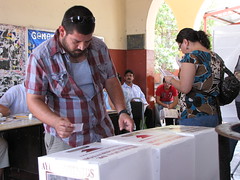
The success of the five PAN-PRD alliances in the July 4 gubernatorial elections has fomented talk of similar arrangements being made for the 2011 gubernatorial and local elections scheduled in at least five states - and most notably in the State of Mexico, where deposing the PRI in the country's most populous jurisdiction would severely diminish the presidential aspirations of Gov. Enrique Peña Nieto.
Already, PAN president César Nava and his PRD counterpart Jesús Ortega - both men having been spared certain destitution because of the electoral successes of their previously maligned alliances - have called for a mega-alliance in the State of Mexico. Potential candidates for the State of Mexico include PAN leader in the Chamber of Deputies, Josefina Vazquez Mota - who isn't anxious to be dispatched to Toluca and thus removed from the presidential race (a move long-promoted by her enemies in Los Pinos) - and former Mexico City mayor and current PRD leader in the Chamber, Alejandro Encinas.
Peña Nieto says he isn't scared of any alliances - a disengenuous position made all the more believable by his striking a secret deal last fall with Nava, PRI president Beatriz Paredes and Interior Minister Fernando Gómez-Mont that called for his block of lawmakers in the Chamber to support the 2010 federal budget in exchange for no alliances being formed in the State of Mexico.
But some commentators have cast doubt on the potential success of an alliance in the State of Mexico and say that the elections of 2011 could prove especially disastrous for the PRD - which might need to form alliances in its own states to stave off a resurgent PRI.
Writing in the newspaper Milenio, Federico Berrueto points to polling data suggesting that the success of the winning alliances in Oaxaca, Puebla and Sinaloa depended more on the unpopularity of the incumbent PRI governors than any other factors.
Citing survey data from GCE - which polls for Milenio - Berrueto listed some of the states with the least-popular governors prior to the elections (with 32 signifying last place):
32. Oaxaca (PRI)
31. Aguascalientes (PAN)
28. Zacatecas (PRD)
27. Puebla (PRI)
26. Tlaxcala (PAN)
In all five states, the incumbent party lost. On the other end of the survey, the states with popular governors holding elections included:
2. Tamaulipas (PRI)
5. Veracruz (PRI)
6. Quintana Roo (PRI)
10. Durango (PRI)
11. Hidalgo (PRI)
The PRI won all five races on July, although its victories in Durango and Hidalgo have been questioned. (In Durango, teachers loyal to the PRI governor of neighbouring Coahuila - who ranked most popular in the CGE survey - poured into the state and helped deliver a narrow victory of less than two percentage points. In Hidalgo, the PAN-PRD coalition somehow managed to claim 45 percent of the vote despite running against a shadowy PRI machine that went so far as to have an opposition campaign office raided by state police on election day morning.)
In the GCE survey, Peña Nieto ranked 12, suggesting the PRI is in for a tight race next year in the State of Mexico.
Ironically, PRD is shaping up as the party with the worst prospects for the coming year. The PRD faces elections in its strongholds of Baja California Sur and Guerrero, which it won in 2005 in an outcome the Reforma newspaper declared, "The end of the Outlaw Mexico."
In the GCE survey, the PRD governors of Baja California Sur and Guerrero ranked 22 and 23 respectively. The PRD is divided in both states and, in 2009, it lost ground to the PRI in Guerrero, which had been divided previously, but made an impressive comeback and even claimed the mayor's office in Acapulco. (Nayarit, governed by the PRI, holds elections in 2011, too.)
Even worse for the PRD, legislative and municipal elections are slated for next fall in Michoacán, where PRD Gov. Leonel Godoy ranks 30 - third worst - on the survey.
Godoy already has discarded the possibility of a coalition in Michoacán - home state of President Felipe Calderón, but a place where the paniísta has failed to establish a significant political base.
The prospect of a resurgent PRI might change Godoy's mind, but chances are that many in the PRD would be loath to broker a deal that so blatently favoured the president.


No comments:
Post a Comment